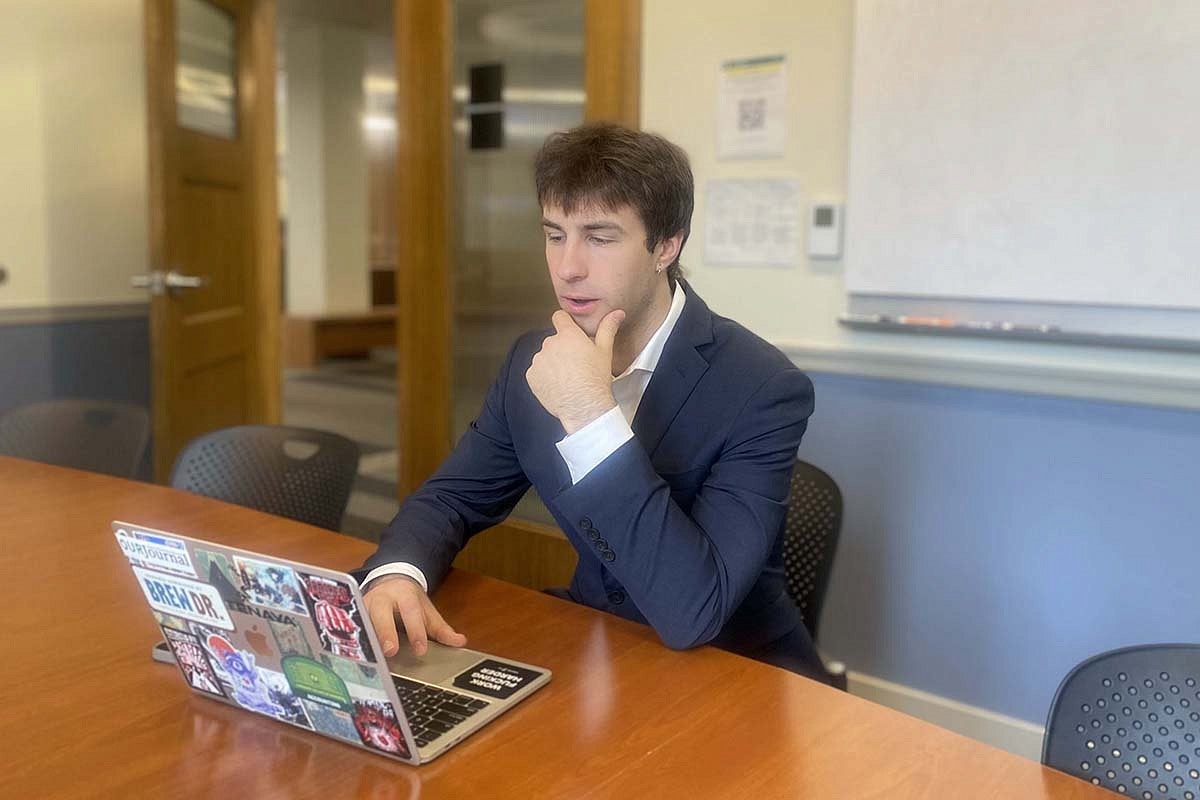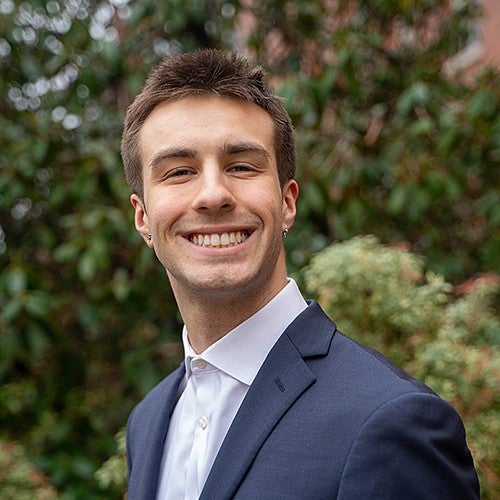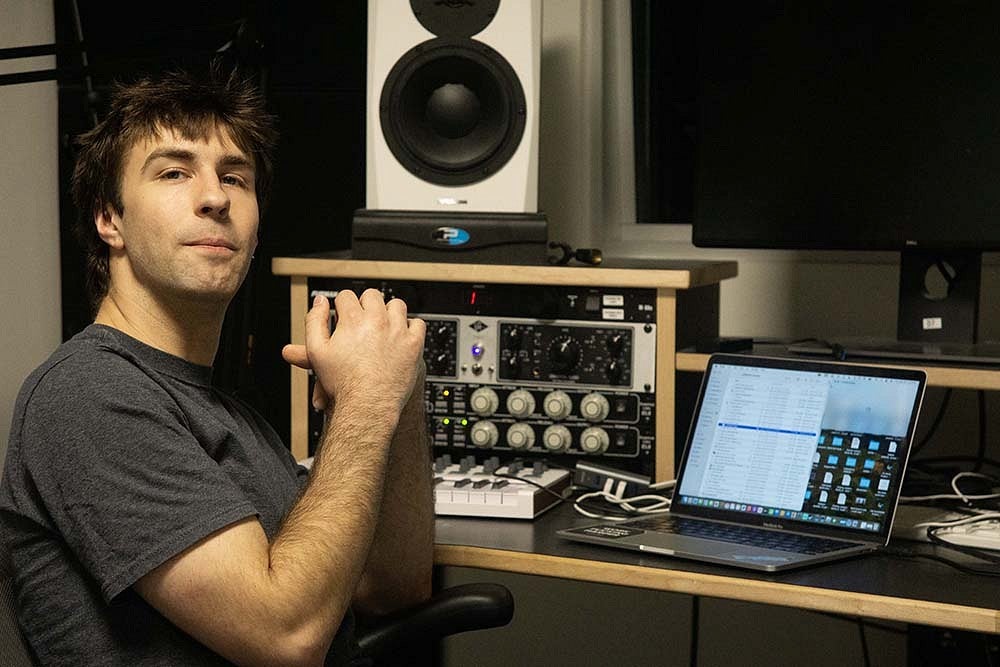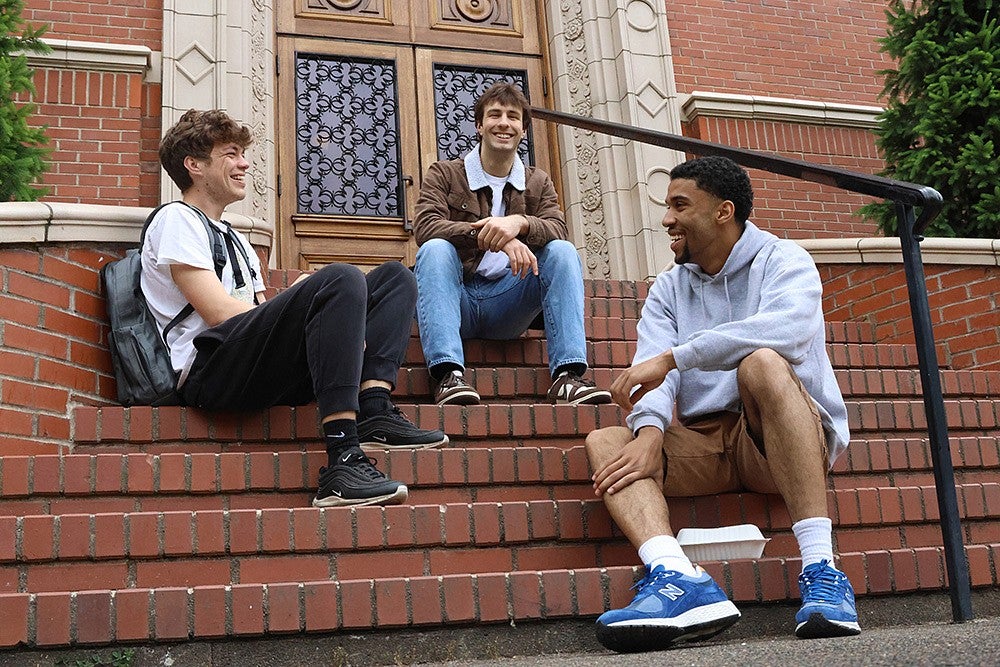
Following the beat
In the entertainment industry, every celebrity or musical artist needs someone to handle the details. Running a business means understanding the less glamorous aspects of the industry, but that doesn’t mean it’s any less critical.
That’s where Connor Lowery-North comes in. The Clark Honors College graduate, who uses they/them pronouns, will be taking their degree in accounting and minor in audio production back home to Atlanta. They’ll be joining PricewaterhouseCoopers this summer as a tax associate intern.
It’s a position that they hope will help them grow in the business world and gain a foothold in the entertainment world.
During Lowery-North’s initial interview with PricewaterhouseCoopers, their contact expressed interest in the music studio Lowery-North operated while at UO. The interviewer told them the company conducts audits for several entertainment clients based in Atlanta. “I was like, ‘That’s so cool. Please put me on that project,’” Lowery-North recalls.
As they prepare to step into a multi-faceted career, Lowery-North says the Honors College helped them remain well-rounded. Graduating from the CHC, they’re leaving with writing skills and a multidisciplinary education that helps them think big. “Specifically in the workforce, it’s something that is really valued — something that they’re really looking for,” they say.

Connor Lowery-North
Major: Accounting
Minor: Audio production
Hometown: Atlanta, Georgia
Coffee or tea? Coffee all the way. I usually have it iced with hazelnut syrup. But if I’m being honest, I’ve got an energy drink addiction.
Song on repeat? “father” by Jim Legxacy
Favorite experience from the CHC? The project-based courses, like Launching New Ventures and Short Film Form: All Summer in a Day. Having the whole term to work on one project is really satisfying.
This summer, I can’t wait for: Returning to Atlanta for an internship at PricewaterhouseCoopers as a tax intern.
Thesis title: “The Importance of Foley in Filmmaking: A Case Study of The Electric House by Buster Keaton”
Advice for incoming first years: Persevere. When I started as a freshman, I hadn’t thought about the big picture. It can be hard to see early on, but as you move forward, think about the benefit of the small things.
I’m grateful for: The people I’ve met and the opportunities I received, especially student groups like Oregon Consulting Group, and getting the chance to pick the brains of the bright people around me.
Their thesis, “The Importance of Foley in Filmmaking: A Case Study of The Electric House by Buster Keaton,” is a testament to that multidisciplinary emphasis. While being a business student, Lowery-North was able to create project-based learning opportunities that speak to what they’re passionate about: music and entertainment.
From a musical theater production of “Into the Woods” and short films made with their sister and friends, Lowery-North has always been creative at their core. Driven by a desire for creative expression, they constantly consumed music and film as a kid. “I knew that I really valued that type of creative outlet, but for a long time, I wasn’t really sure how to get there,” they say.
Lowery-North began experimenting with making music in high school. When COVID arrived, it became a way to pass the time. They began to develop a passion for the work, and it was evident in the opportunities they sought out.
They began working with producers at Burn Money Music in Portland, where a professional audio engineer supported Lowery-North’s growth. “We recorded a lot of music together, but he also taught me software and those complex things that are really hard to learn by yourself,” Lowery-North says. “When that happened, I started being able to make my own music.”
They knew from the moment they committed to the CHC and UO that they’d pursue an audio production minor. Dedication to their passion for music continued to open doors for Lowery-North, landing them an internship at Surfing Giant, a post-production studio based out of Los Angeles, after their sophomore year. There, they learned to put their audio skills to practical use. They did so well that they were invited back for a second summer.
The music Lowery-North produced during their time there accompanied films, and they discovered the connections between the two. “It's way bigger than music,” they say. “I learned to incorporate my interest in film into my interest in music, and how they make sense together.”

Their work in entertainment production led them to their thesis, where they dedicated time to piecing together the sounds and audio for a silent film from 1922, “The Electric House” by Buster Keaton. Lowery-North says piecing together sound effects for film and television—known as Foley—“is a very underrated art. And that’s because of the nature of what it is, it’s not really meant to be noticed,” they say.
The project was ambitious—creating thousands of sound effects for a 20-minute film. From subtle footsteps that conveyed distance and movement to complex soundscapes that brought the silent era to life, every detail mattered.
“Connor is really earnest. They’re curious about things, and they’re very open and sincere,” says Brian McWhorter, a professor of music at the Clark Honors College and Lowery-North’s thesis advisor.
McWhorter, who specializes in arts-based research, was drawn to Lowery-North's interdisciplinary approach. “They initially talked about how they could do a thesis on the economic sustainability of music studios, and then they moved to this thing called Foley, which I have long felt strongly about as an art form,” McWhorter says.
The thesis process wasn't without its challenges. Lowery-North had focused intensively on the artistic work itself—the painstaking process of creating each sound effect—but struggled with the accompanying academic document.
True to form, Lowery-North approached the challenge head-on. “They didn’t cut any corners in their work,” McWhorter recalls. “They dove straight in really hard, and got the work done in a really excellent way.”
What impressed McWhorter most was how Lowery-North overcame their tendency toward self-doubt. “They minimize themself too much,” McWhorter notes, but by the time of their thesis defense, “it was this kind of gloriously balanced approach. They were just stating what they had done, and that was really impressive.”

Beyond the academic work, Lowery-North's passion lies in supporting emerging artists. During their junior year, they founded Pleasant Hill Studios in Eugene, focused on helping small local artists record their demos. The venture was deeply personal—they understood the challenges facing independent musicians trying to break into an industry that often exploits newcomers.
“A lot of people are interested in it, but don’t know the inner workings of the industry,” Lowery-North says. “By the time they figure it out, they've already been taken advantage of by these records and labels.” They’ve witnessed the predatory practices firsthand, from scammers promising record deals for upfront payments to industry veterans who prey on artists’ hopes and dreams.
The studio had to shut down due to issues with the building owners, but the experience reinforced Lowery-North's commitment to artist advocacy. “I love watching people develop,” they say. “I hope to one day be able to be someone who can help smaller artists and creators get a platform.”
Leadership roles with organizations like the Lundquist College of Business’s Oregon Consulting Group and the CHC Student Advisory Council have helped them hone skills in communication and advocacy. “I’m trying to be more outspoken and stand up more for what I believe in,” they say.
After the summer internship, Lowery-North says they plan to return to UO for a master's in accounting, a move that will help build the business expertise necessary to serve their entertainment industry goals.
The path may seem unconventional—from Foley artistry to tax preparation—but Lowery-North sees the connections clearly. Every artist, every studio, every entertainment company needs someone who understands both the creative vision and the business realities.
“Connor takes notes,” McWhorter says. “They process criticism. They synthesize suggestions, and they do so with this joyful attitude about it all.”
For Lowery-North, the combination makes perfect sense. Whether it all leads them to New York City, Los Angeles, or back to Eugene, they're confident in their preparation.
“I feel like more than ever before, I’m seeing the path that I want to go down,” they say.

